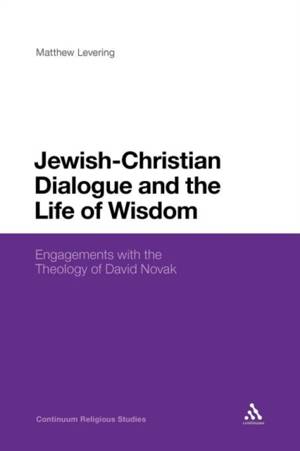
Bedankt voor het vertrouwen het afgelopen jaar! Om jou te bedanken bieden we GRATIS verzending (in België) aan op alles gedurende de hele maand januari.
- Afhalen na 1 uur in een winkel met voorraad
- In januari gratis thuislevering in België
- Ruim aanbod met 7 miljoen producten
Bedankt voor het vertrouwen het afgelopen jaar! Om jou te bedanken bieden we GRATIS verzending (in België) aan op alles gedurende de hele maand januari.
- Afhalen na 1 uur in een winkel met voorraad
- In januari gratis thuislevering in België
- Ruim aanbod met 7 miljoen producten
Zoeken
Jewish-Christian Dialogue and the Life of Wisdom
Engagements with the Theology of David Novak
Matthew Levering
Paperback | Engels
€ 88,45
+ 176 punten
Uitvoering
Omschrijving
This book inquires as to whether theological dialogue between Christians and Jews is possible, not only in itself but also as regards the emergence of communities of Messianic Judaism. In light of David Novak's insights, Matthew Levering proposes that Christian theological responses to supersessionism need to preserve both the Church's development of doctrine and Rabbinic Judaism's ability to define its own boundaries. The book undertakes constructive philosophical theology in dialogue with Novak. Exploring the interrelated doctrines of divine providence/theonomy, the image of God, and natural law, Levering places Novak's work in conversation especially with Thomas Aquinas, whose approach fosters a rich dialogue with Novak's broadly Maimonidean perspective. It focuses upon the relationship of human beings to the Creator, with attention to the philosophical entailments of Jewish and Christian covenantal commitments, aiming to spell out what true freedom involves. It concludes by asking whether Christians and Jews would do better to bracket our covenantal commitments in pursuing such wisdom. Drawing upon Novak's work, the author argues that in the face of suffering and death, God's covenantal election makes possible hope, lacking which the quest for wisdom runs aground.
Specificaties
Betrokkenen
- Auteur(s):
- Uitgeverij:
Inhoud
- Aantal bladzijden:
- 224
- Taal:
- Engels
Eigenschappen
- Productcode (EAN):
- 9781441180636
- Verschijningsdatum:
- 29/12/2011
- Uitvoering:
- Paperback
- Formaat:
- Trade paperback (VS)
- Afmetingen:
- 156 mm x 234 mm
- Gewicht:
- 312 g

Alleen bij Standaard Boekhandel
+ 176 punten op je klantenkaart van Standaard Boekhandel
Beoordelingen
We publiceren alleen reviews die voldoen aan de voorwaarden voor reviews. Bekijk onze voorwaarden voor reviews.









